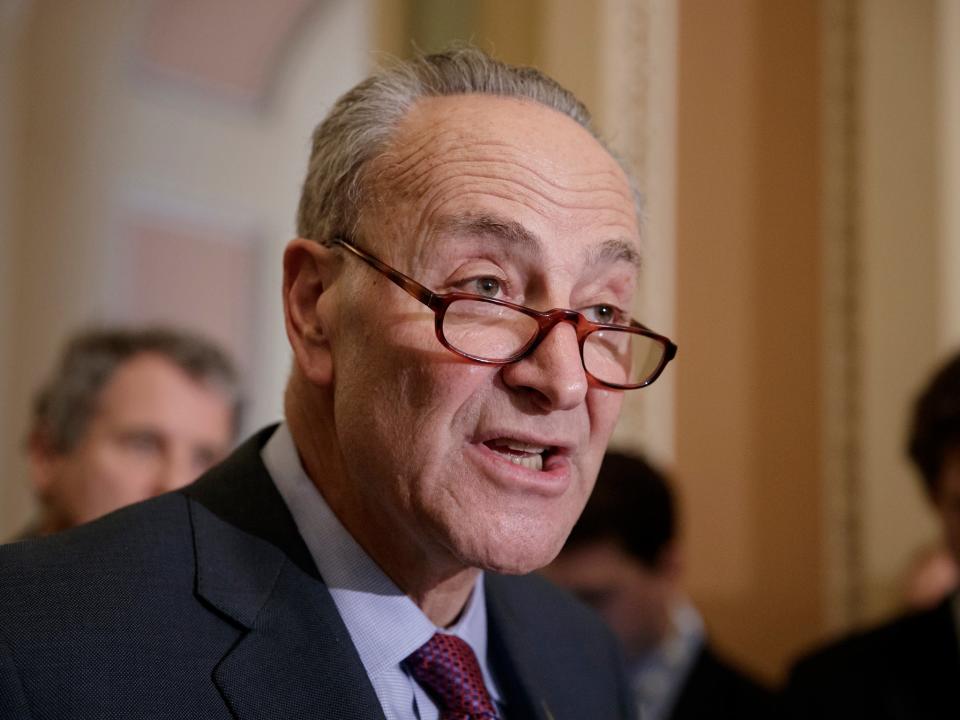‘Nothing is off the table’: Democrats threaten extraordinary measures if Republicans fill vacant Supreme Court seat

“Nothing is off the table next year,” said Senate Minority Leader Chuck Schumer in a conference call with congressional Democrats on Saturday.
The call was to discuss a response if president Donald Trump and the Republican Party move to fill the Supreme Court vacancy left after the death of Justice Ruth Bader Ginsburg.
The possibility of a nominee not being confirmed by a vote in the chamber remains, but is deemed unlikely. There are questions about timing though and whether confirmation could be pushed through before the election or in the lame-duck session after 3 November.
With polling that suggests they are currently favoured to win back control of the Senate, Democrats could move ahead with a wishlist of progressive changes to government once thought unattainable.
The response is likened to “total war” and “armageddon” by one commentator and could fundamentally remake the judicial and legislative branches of government.
To begin, the number of justices on the Supreme Court is not fixed and could be changed with an act of Congress signed by the president — this would require a Joe Biden victory.
Congressman Joe Kennedy III tweeted on Saturday: “If he [McConnell] holds a vote in 2020, we pack the court in 2021.”
A sentiment echoed by House Judiciary chairman Jerry Nadler: “If Sen. McConnell and @SenateGOP were to force through a nominee during the lame duck session — before a new Senate and President can take office — then the incoming Senate should immediately move to expand the Supreme Court."
The concept of expanding the court has been around since the president Franklin Delano Roosevelt, who wanted to add justices to encourage the older members to retire. An expanded court would also mean that individual justices are less critical to the function of democracy and the death or retirement of one would not necessarily trigger a political crisis.
The idea resurfaced in 2016 after Senate Majority Leader Mitch McConnell refused to allow a vote on the appointment of Merrick Garland to the court, and the concept was embraced by a number of Democrats including presidential primary candidate Pete Buttigieg and former attorney general Eric Holder.
If he holds a vote in 2020, we pack the court in 2021.
It’s that simple.— Rep. Joe Kennedy III (@RepJoeKennedy) September 19, 2020
Presidential nominee Joe Biden has previously said he is not in favour of adding justices, but may be swayed by the current mood in the party. Justice Ginsburg said last year that she was opposed to an expanded court.
An alternative or additional measure would be a constitutional amendment limiting the term length that justices could serve, allowing for more turnover. Presidential primary candidate Andrew Yang proposed an 18-year cap.
A Democrat majority could also end the Senate’s 60-vote threshold to end a filibuster, a tactic that has stalled many pieces of legislation. This could be changed to a simple majority vote.
Former president Barack Obama spoke about changing the rules about the filibuster in his eulogy for congressman John Lewis, and included other ideas to honour the late lawmaker that could be rolled out by a new congress.
“Once we pass the John Lewis Voting Right Act, we should keep marching to make it even better. By making sure every American is automatically registered to vote, including former inmates who’ve earned their second chance. By adding polling places. And expanding early voting and making election day a national holiday,” Mr Obama said.
Perhaps the most dramatic way in which a Democrat controlled Congress could attempt to reform the legislative branch would be by pushing for statehood for both the District of Columbia and Puerto Rico — both almost guaranteed to return Democratic lawmakers.
Filling the SCOTUS vacancy during a lame duck session, after the American people have voted for new leadership, is undemocratic and a clear violation of the public trust in elected officials. Congress would have to act and expanding the court would be the right place to start.
— Rep. Nadler (@RepJerryNadler) September 19, 2020
Giving US citizens representation in the federal government and adding two more stars to the Stars and Stripes would not be easy though — a constitutional amendment would likely be required.
Nevertheless, Democrats are gearing up for a fight with House speaker Nancy Pelosi not dismissing the idea of a second impeachment of the president or attorney general William Barr.
In an appearance on ABC’s This Week, she said: “We have our options. We have arrows in our quiver that I’m not about to discuss.”
She later added: “We have a responsibility to meet the needs of the American people. When we weigh the equities of protecting our democracy, [it] requires us to use every arrow in our quiver.”
Read more
Trump promises to replace Ginsburg with a woman - and soon
Trump seizes chance to reshape America following death of Supreme Court judge Ruth Bader Ginsburg
Nancy Pelosi refuses to rule out second impeachment of Trump to delay Supreme Court battle
Democrats smash donation records following death of Ruth Bader Ginsburg

